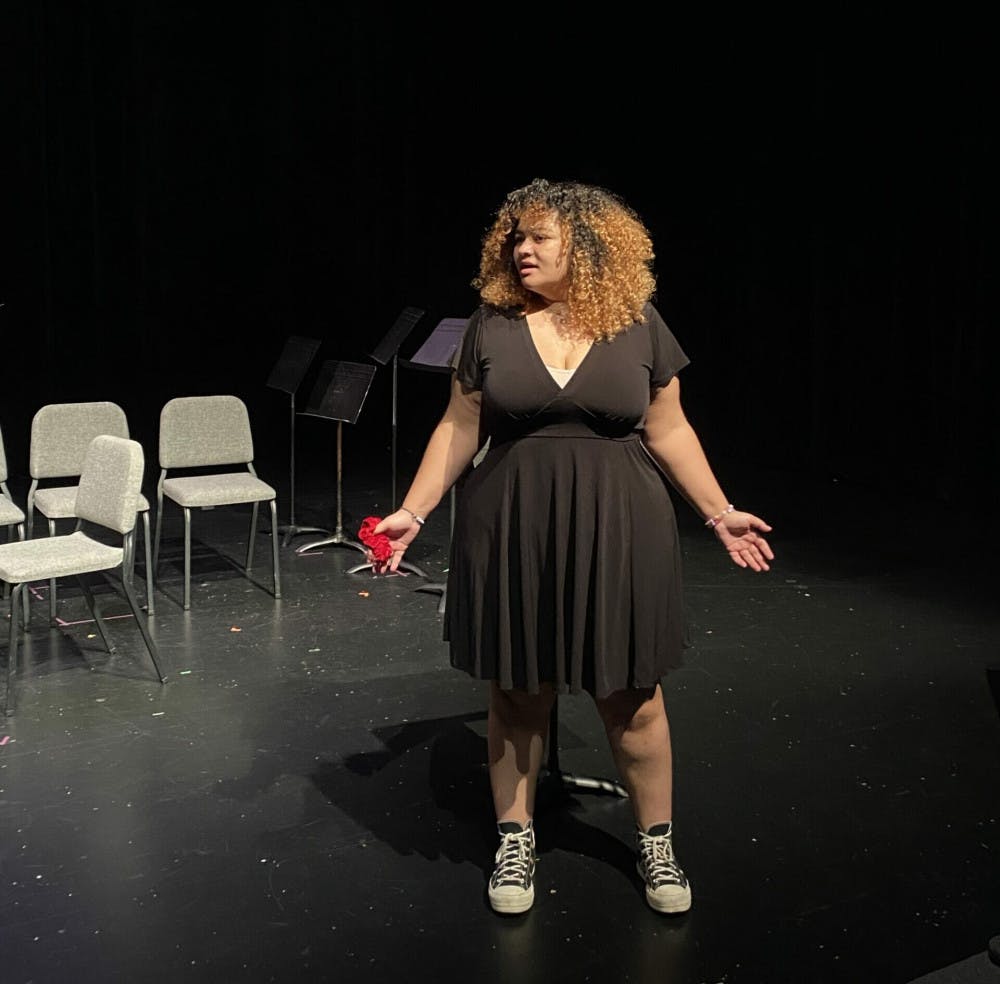
In the heat of summer 2011, a cherry red Ford F-150 exited Interstate 75 toward Valdosta, Ga. The truck arrived at Moody Air Force Base in late July carrying medieval scenery, felt corset tops and an ostentatious gold crown.
The Missoula Children’s Theatre unloaded these items at the base theater in preparation for their production of “King Arthur’s Quest” (2011), a musical written by Michael McGill, the theater’s then-executive director. Over the span of five days, the traveling theater company would go on to cast, direct and produce the 45-minute production. On Monday morning, 7-year-old Makalee Cooper (23Ox, 25C) performed the nursery rhyme “Row, Row, Row Your Boat” for two Missoula camp directors. On Friday night, with wild hair and wide eyes, Cooper took the stage as mini King Arthur. Her mother Tammie Cooper immediately noticed her acting talent during the performance.
“She was very young,” Tammie said. “But she got up there and she just lit up the stage.”
Now a junior at Emory University 13 years later, Makalee prepared to shine again. One by one, she shook her limbs. She started with her hands, the clash of her beaded friendship bracelets accompanying her sporadic movements. Next, she shook out her feet with her torn black Converse blurring against the dark floor. Caramel-colored eyelids concealed her dark eyes as a deep inhale filled her chest.
Under the amber spotlight in the Schwartz Center of Performing Arts Theater Lab, Makalee anticipated her performance of “Teeth,” an original play written by Sophie Reiss (25C). It was the first block of shows for the Lenaia Student Playwriting Festival at Emory, which is the University’s only entirely student-run, student-written and student-performed celebration of original work. Makalee played June, a woman on the brink of insanity, battling with the oppression of her daily life and the pervasive violence in her heterosexual relationships.
“It’s really hard to find that balance between showing somebody who is obviously not doing well mentally and depressing the audience,” Makalee remarked the following afternoon. “I don’t want to sound like Eeyore.”
“Teeth” ended in a contradictionary sequence, pinning an abrupt display of energy against an uncomfortable tranquility. In an expression of her newfound liberation, June kicked at her chair — she missed at first and her black Converse sliced the air. She stomped around the stage, pulling at her dress and tugging a red scrunchie from her head to unleash her curly hair. In the final minute of the play, she stood panting and staring out at the audience in silence. Her stare pierced through the unassuming spectators.
“It’s interesting to have the ending looking straight out into the audience … because I could immediately gauge how people were feeling about it,” Makalee said the day after her performance. “I did look at one girl and it seemed like she was trying not to laugh.”
However, Makalee was not dismayed. After all, this reaction is one familiar to her.
Makalee’s first major role in theater was as the customer in “Little Shop of Horrors” (1986) at J.L. Newbern Middle School in Valdosta, Ga. When she auditioned for “Beauty and the Beast” (1994) during her sophomore year at Valdosta High School, Makalee felt she was a shoo-in for Miss Potts — a large role in the production — but she was cast in the ensemble. In her final performance during her senior year, Makalee played Grandma Addams, the cantankerous old matriarch of “The Addams Family” (2009).
“I was never ever, ever, ever being cast as the romantic lead,” Makalee said.
Makalee believes that her fate as the supporting character, the side-kick or the comedic relief, was not a result of ineptitude. When Makalee entered the auditorium, the route to stardom had already been closed. When she took the stage for an audition, her body type overshadowed her talent. Although Makalee was constantly praised by her peers and mentors, her body offset her gifts.
“If I was going to get cast as a larger role, it would either be the comic relief, or the mother, or the older mature woman,” Makalee said. “The largest role I had while I was in middle school was Paulette in ‘Legally Blonde’ [(2007)], the musical, and that’s like, ‘OK, that’s a good little role,’ but once again, comic relief side character, who’s allowed to be unattractive.”
The barrage of unserious roles allotted to Makalee throughout high school almost convinced her to quit acting altogether — almost.
Backstage at Valdosta High School, Makalee pulled on her striped stockings, large black dress and mangled gray wig to become Grandma Addams. Even under a layer of makeup designed to hollow her plump cheeks and paint wrinkles upon her forehead, Makalee looked toward the future.
“I know that I can act at the end of the day,” Makalee said. “That is one thing I’m really confident [in]… So I’m always like, ‘I know something better is going to be coming.’”
In her first semester at Oxford College, the opportunity Makalee was wishing for finally came. In October 2018, Assistant Professor of Theater Nick Fesette directed “As You Like It” (1623) by William Shakespeare. Fesette said the production’s lead character Rosalind was meant to be outspoken, smart, brassy and of course, seductive.
When Makalee showed up for the audition, she was on the fence about pursuing theater in college as one more casting snub would crush her. However, Fessette saw Makalee’s potential during her audition to play the lead.
“Immediately I was like, ‘This is Rosalind,’” Fesette said.
According to Makalee, Fesette was the first person who saw beyond the surface and valued her talent over her appearance. Makalee felt a sense of disbelief being cast as Rosalind after years of being excluded from more serious roles.
“I was like, ‘Oh my gosh, it’s not me,” Makalee said. “Because that’s how it always felt … like that I’m not good enough, I’m doing something wrong.”
Fesette now serves as Makalee’s mentor for the Mellon Mays Undergraduate Fellowship program, which will financially and educationally support Makalee into a graduate program. As part of this program, Makalee is required to complete a research project on a topic of her choosing. With the help of Fesette, Makalee is investigating the prevalence of fatphobia against men in American television and plays in the 21st century.
“The theater is a very, very, very fatphobic field, and it also doesn’t really like women of color,” Makalee said.
For Makalee, there is nothing more serious than eliminating fatphobia in the theater. To confront typecasting and discrimination on Emory’s campus, she joined the casting and creative team for the 2023-24 season of the Lenaia Student Play festival. In her role on the executive board, Makalee focused on making unconventional casting choices. Makalee doesn’t believe she would ever have been cast as June from “Teeth” via audition.
“When there are stories that are about female rage, people are always expecting to see a small white woman,” Makalee said. “I’ll say it, I’ll say it.”
More than a decade later, the little girl who sang nursery rhymes under a sweltering sky on Moody Air Force Base turns her mind toward the future. Makalee is a mosaic of her past roles, from the excited mini King Arthur to the struggling June. She is a performer, a pioneer and, of course, a future professor.
As a professor, Cooper hopes to challenge the traditionally fatphobic culture in the theater and inspire students to pursue their passions regardless of their physical appearance.
Through scholarship and leadership, Makalee wants to ensure that people of alternative body types are taken seriously, not typified as the butt of a universal joke.
“I really want to be the person who other people can look to and be like ‘Oh, I can be in this profession.’” Makalee said.
Catherine Goodman (26C) is the Managing Editor of Arts & Life and Editorial Board. She is a double major in English and Art History. She plans to pursue arts and culture journalism, with a special interest in criticism and feature writing. When she isn't listening to music or writing her column, you can find her baking specialty cakes or playing with her dog, Apollo.









